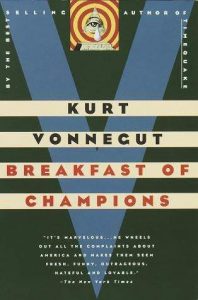Revisiting a Classic: Kurt Vonnegut Delivers a Masterpiece with Breakfast of Champions
Jonathan Smith // Blog Writer
Originally published in 1973, Kurt Vonnegut’s Breakfast of Champions offers some of the wittiest satire in the history of American literature. Vonnegut’s signature political and social commentary, as evident in his popular novels Slaughterhouse-Five and Cat’s Cradle, allows readers to view the hypocrisy of the modern world in ways they may have never considered. Vonnegut’s undeniably straightforward yet shrewd literary voice, mixed with a vignette-style narrative, leads to an unforgettable adventure through Midland City. The experience resonates with readers furthermore with the inclusion of cartoonish drawings from Vonnegut himself.

Breakfast of Champions embraces a very loose plot structure. In fact, it is easier to consider the novel a search for life’s greater meaning rather than examine the actual events of the plot. Vonnegut approaches this premise by delving into the lives of multiple characters, the two most prominent being Dwayne Hoover and Kilgore Trout. Hoover, a rich, popular entrepreneur in Midland City, has just lost his wife due to suicide and is on the verge of insanity at the beginning of the novel. Trout, on the other hand, is an elderly science-fiction writer who has been invited to speak at an arts festival halfway across the country in Midland City. The founder of the arts festival has a love for Trout that borders on obsessive, though Trout’s readership is extremely limited and he refuses to believe his art has produced any positive or negative change in society.
Vonnegut transitions seamlessly between Hoover, Trout, and minor characters. Upon reading the first fifty pages or so, readers may feel confused as to where the story is going. This is intentional, of course, because Vonnegut deliberately chooses a nonlinear structure to give room for social and political commentary. Among the topics under critique are the ignorance of celebrating Columbus Day and the effects of global warming on the earth. The narrator is purposely delivering information to the reader as if they are discovering earth for the first time, with systemic racism and sexism on full display. The complexity of everyday life—and how each person attempts to find meaning in the cards they are dealt—is also on full display. However, not every character is fully realized and there are stereotypes embedded in certain individuals. But readers find characters like Trout with who they will automatically identify.
As the novel progresses, the narrator’s use of the word “I” increases, with the first person perspective yielding an entirely new character many readers will not see coming. Vonnegut’s wit is apparent, and his confidence in his literary voice allows him to repeatedly embrace such phrases as “listen” at the beginning of sentences and “etc.” at the end of sentences. The former directly commands the reader to engage with the story’s setting and events; the use of the latter reflects on the reoccurring theme of eternity expressed throughout the novel. There is an element of verve in Vonnegut’s prose, which engages the reader as he or she attempts to grasp all the complexities produced throughout the storyline.
It is this insatiable search for life’s purpose that enables Breakfast of Champions to be so approachable and organic. In many ways, the last act of the main storyline does not initially give one satisfaction because there are certain loose ends left for the reader to contemplate. Perhaps these loose ends are analogous to those of Vonnegut’s personal search for meaning in life. Though Vonnegut himself reported in his semi-autobiographical book Palm Sunday that he was displeased with the outcome of Breakfast of Champions, the novel is of significant relevance to this day. Vonnegut newcomers and longtime fans will find this novel’s themes pertinent to American history, and that rereading its content is as enjoyable as it is crucial to understanding Vonnegut’s core message.
Final Rating: 9.5/10

One Comment